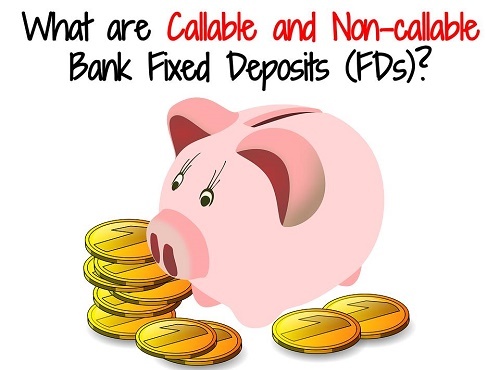What are Callable and Non-callable Bank Fixed Deposits (FDs)?
Recently in its Sixth Bi-Monthly Monetary Policy Statement, 2014-15, RBI proposed another type of Fixed Deposit. These are called non-callable Bank Fixed Deposits (FDs). To implement this, few days back Axis Bank launched the first non-callable Bank Fixed Deposit (FD). Let us see what are callable or Non-callable fixed deposits and what is the difference between them.

What are the current features of Bank Fixed Deposits (FDs)?
- You earn the different interest rate based on the amount you deposit like less than Rs 1 Cr and above Rs 1 Cr.
- You earn the different interest rate based on the tenure. Longer the FD tenure means more interest rate.
- You earn the different interest rate based on the age. All banks offer higher interest rate for senior citizens.
- Banks charge some penalty for pre-closure of FDs.
What are callable Bank Fixed Deposits (FDs)?
These are FDs, which you can withdraw at any point of time before maturity. Bank charges some penalty on this (depending on the tenure of deposit). But there is no lock-in in such FDs (apart from tax saving FDs).
What are Non-callable Bank Fixed Deposits (FDs)?
These are the FDs, which you can't withdraw before a maturity period. Hence, these are completely locked FDs.
Therefore, the meaning of CALLING here is, you as a deposit calling means withdrawing the FD. Hence, callable means you are calling your deposit for withdrawal. Non-callable deposits means, you have no authority to call or withdraw it before the maturity date.
Why Banks offer Non-callable Bank Fixed Deposits (FDs)?
Let us say you are Bank. You received the money from a depositor for a certain period. You cannot pay the interest to depositor simply keeping it in your home or savings account. You have to invest somewhere or lend it to someone who can provide you the return at least equal or more than the rate at which you have to pay to the depositor.
Now let us say Mr.X deposited Rs.75 lakh for a tenure of 5 years. You lend or invested the same to Mr.Y for higher interest than what you have to pay to Mr.X for the same tenure of 5 years. From this transaction, your headache of giving the interest to Mr.X almost finished. Because you are getting higher interest rates from Mr.Y. So you take some profit (Difference between the interest of Mr.Y and Mr.X) and the rest will be payable to Mr.X.
However, what if Mr.X returns to you after a year and asked for the return of FD amount? You run for a cash to pay to Mr.X. In such a situation, Mr.Y may or may not return the lend money. This is something called as asset-liability management issues. To avoid such situations, RBI proposed Non-callable fixed deposits.
Let us look at the first such deposit, which was offered by Axis Bank as "Axis Bank's Fixed Deposit Plus."
- The minimum amount that you can deposit is Rs.15, 00,001 lakh.
- Premature withdrawal not allowed. However, in case of bankruptcy/winding up / directions by court/regulators/receiver/liquidator / deceased cases one can withdraw it.
- If premature withdrawal happened due to above said scenarios, then such deposits are treated as callable FD. Interest will be applicable as normal FD and the penalty charges.
- However, a premature penalty not charged if the closure request has not been initiated by the depositor.
- Tenure of such deposit is from 1 year to 2 years maximum.
- You cannot auto-renew such deposit.
- You can choose options of simple interest and compound interest.
- This deposit is available for both Indian as well as for NRIs too.
- You can refer the interest rate for Indians at HERE and for NRIs at HERE.
- Currently, Axis Bank is offering you 8.20% for a one-year callable FD. However, for Non-callable one year FD the interest is fixed at 8.30%. The difference of 0.10%. (Not a great deal for small investors).
Who can invest in such Non-callable Bank Fixed Deposits (FDs)?
You notice that this type of FD comes with the large minimum deposit requirement (In case of Axis Bank it is a minimum of Rs.15, 00,001). Therefore, if you feel that your goal is fixed in short periods like one or 2 years and you no more required such money, then you can easily deposit. Otherwise, only looking at high interest if you deposit then you may be in trouble of liquidating it.
In addition, you notice from Axis Bank's Fixed Deposit Plus that the minimum and maximum tenure is 1 year and 2 years respectively. Therefore, you cannot park your idle cash in such deposit for few months. At the same time, you can deposit for more than 2 years.
The difference between Axis Bank's normal FD to this Non-callable FD is just 0.10%. I don't think because of this meager interest difference one will deposit and lock his money. Think before investing in such Non-callable FDs.
Top 10 Tax Saving Mutual Funds to invest in India for 2016
Best 10 ELSS Mutual Funds in india for 2016
1. BNP Paribas Long Term Equity Fund
2. Axis Tax Saver Fund
3. Franklin India TaxShield
4. ICICI Prudential Long Term Equity Fund
5. IDFC Tax Advantage (ELSS) Fund
6. Birla Sun Life Tax Relief 96
7. DSP BlackRock Tax Saver Fund
8. Reliance Tax Saver (ELSS) Fund
9. Religare Tax Plan
10. Birla Sun Life Tax Plan
Invest in Best Performing 2016 Tax Saver Mutual Funds Online
For further information contact Prajna Capital on 94 8300 8300 by leaving a missed call
---------------------------------------------
Leave your comment with mail ID and we will answer them
OR
You can write to us at
PrajnaCapital [at] Gmail [dot] Com
OR
Leave a missed Call on 94 8300 8300
-----------------------------------------------